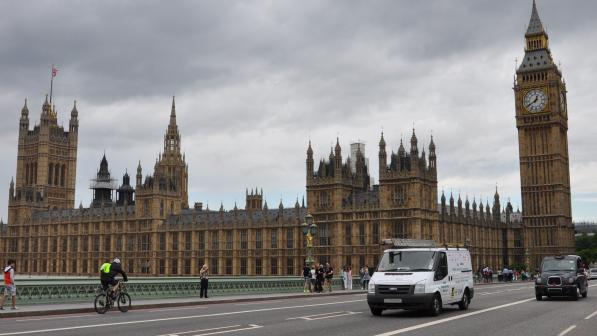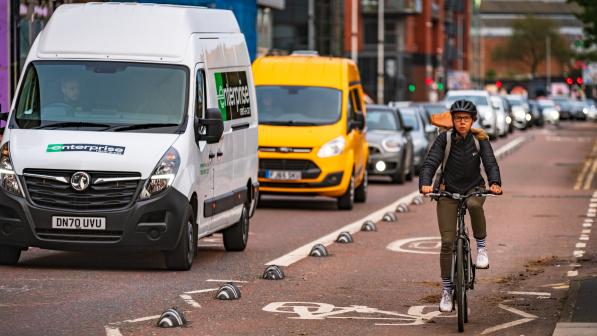Plan for Drivers ignores those who need help most

“I couldn’t always afford to make extra journeys on public transport so would miss out on visits with friends especially that live far away, now I cycle there and back. I spend half of what I used to on travel expenses because I [can] cycle to places.”
That was the experience of Beth from Scotland who received a bike through a Cycling UK project and explained how it has given her more choice in how she gets about. As a result of our help, she has started cycling for work, shopping, and other everyday journeys and it has helped her save a lot of money.
Beth is not unusual in that she doesn’t own a car and can find the cost of public transport limits how much she can travel. In the UK, about one in four households don’t own a motor vehicle, and for low-income households that rises to almost one in two.
Women and people from diverse ethnic backgrounds are less likely to drive or own a car, and of course children, along with some elderly and disabled people, cannot drive at all. What’s more these groups of people are also those worst affected the effects of motor traffic, such as pollution.
Any policies prioritising car use not only leaves many people stranded, it also ignores the most disadvantaged and poorest in society. Any society that favours private cars over other modes of transport is an unequal society.
Reliance on cars
This week Rishi Sunak unveiled his Plan for Drivers at the Conservative Party Conference, to “help put motorists back in the driving seat”. This may be a pre-election lurch away from his own government’s policies in order to swing votes his way, but it has huge implications for those who cycle, walk or use public transport.
Previously Mr Sunak had said he would appraise low traffic schemes because: “The vast majority of people in the country use their cars to get around and are dependent on their cars.”
The PM has come to the right conclusion but the wrong solution.
It’s true that too many people are forced into being reliant on their cars, but the answer is not to make driving easier – instead government should be reducing this reliance by providing greater choice in how we get about and creating better transport options.
Cycling UK has been strongly critical of this policy saying that the government is robbing people of choice.
Sarah Mitchell, Cycling UK’s chief executive, commented: “We need a holistic plan for how people can travel – not a plan that zooms in on one particular mode of transport. A plan that gives us the freedom to choose how we travel, maximising our ability to opt for healthy, cheap and convenient options.”
We will continue to push back against UK Government transport plans which limit people’s freedom to choose by prioritising car use over cycling and sustainable alternatives
Jim Densham, Cycling UK campaigns and policy manager
Challenging transport poverty
This week is Challenge Poverty Week in Scotland – in England and Wales it is on 16-22 October. My colleague Suzanne Forup has penned a guest blog for the Poverty Alliance to highlight how cycling helps to tackle poverty.
The costs of car ownership can eat up one-fifth of one’s income, and for those reliant on a car, it can lead to transport poverty, with Sustrans estimating that one million people are at high risk in Scotland alone.
Many people, particularly in rural areas, also experience ‘forced car ownership’, a situation in which they must own a car due to a lack of other transport options, but can’t fully afford it and therefore have to cut back on other expenses and limit their travel.
The UK needs better, fairer and affordable transport systems – where people have more choice in how they travel and aren’t reliant on a car to get about. It’s time for government to rebalance our transport system and reduce society’s reliance on car use.
Cycling can tackle poverty
The PM should be focused on fairly addressing the cost of travel rather than talking up short-term vote winning policies.
We know that cycling can help tackle inequalities and it’s a form of transport with very low running costs. It’s ideal for many of our short everyday journeys: to visit friends, to go shopping and reach places of education or work.
Cycling can be a money-saver for those who don’t drive, and for those who do own a car but want to try other travel options. For those that need to maintain a car but can switch some car journeys to cycling the savings can accumulate.
Geraldine*, one of the e-bike loan participants at Cycling UK’s Golspie Bothy, made the leap to purchase an e-bike after she calculated that her journey to work would cost 11p by e-bike instead of £4.98 by car. An interest-free agreement from her local bike shop meant she was able to purchase her e-bike over a period that worked for her budget.
Cycling can help tackle poverty and be transformational for individuals, communities and our planet, and be a tool for social justice.
Cycling UK’s projects support people to make the transition from car to cycle, providing direct support where we have our place-based programmes and supporting local community organisations.
How you can make a difference
The Plan for Drivers locks people into a high-cost form of travel which may be OK for some but for many it perpetuates the pain and costs of living.
We will continue to push back against UK Government transport plans which limit people’s freedom to choose by prioritising car use over cycling and sustainable alternatives.
Colleagues have been at the Conservative Party Conference this week in Manchester talking to MPs about cycling and have received a positive response about the need for more choice in transport.
Next week, focus shifts to the Labour Party Conference in Liverpool and our team will be aiming for further positive conversations on the less traffic, more cycling theme.
Read more about our Less traffic, more cycling campaign and the reasons why this is important.
You can help by asking Rishi Sunak and ministers to stop attacking low traffic neighbourhoods and 20mph zones in England – measures which will enable more people to cycle and give them a viable option to get on a bike instead of reaching for the car keys.
You can also donate to help us to campaign on this issue.
*Name changed to protect privacy





